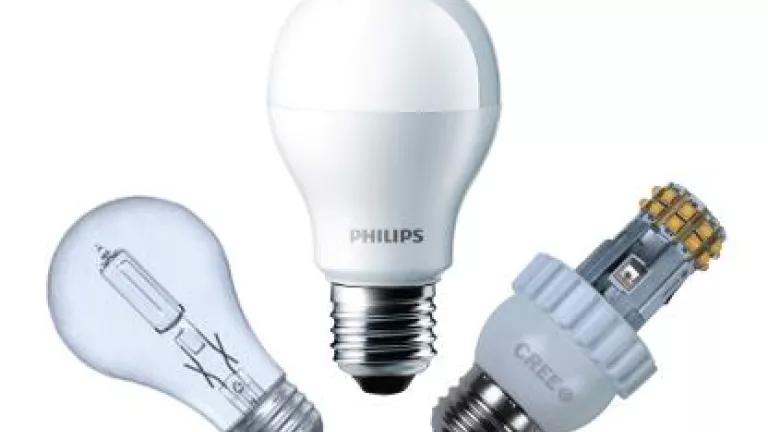Federal Budget Stunts like Blocking Enforcement of Light Bulb Standards Put U.S. Jobs at Risk

As the U.S. House begins debate over funding for the nation’s energy and water programs, it’s clear that the House Republican energy plan relies on political stunts and polluter- backed policy. The Republican-backed federal spending bill is set to become a vehicle for a number of misguided legislative maneuvers wholly unrelated to the budget and aimed at blocking programs that help Americans save energy while cutting harmful pollution.
A prime example is the amendment expected by Rep. Michael Burgess (R-TX) targeting energy-saving light bulbs. Originally designed by Energy and Commerce Committee Chairman Fred Upton (R-MI) and signed into law six years ago by President George W. Bush, energy efficiency standards for everyday bulbs have been phased in over the last two and a half years, giving them the first major technology update since the days of Thomas Edison.
As a result, an energy-saving light bulb that complies with federal standards is now available for every socket in America.
When all of the old energy-wasting incandescent are replaced with these upgraded versions, the standards will save consumers $13 billion per year.
Despite these benefits, some Republicans want to use back-door spending bill amendments to undo these standards and win points with Tea Party ideologues who somehow think reducing energy waste and providing consumers more choice is anti-American.
The Burgess amendment—similar to what he has proposed in the past--would once again prohibit funding for any enforcement of the light bulb standards. This would open the door for foreign companies to sell substandard versions in America. That is one reason all major U.S. lighting companies –including GE, Philips, and Sylvania – support the technology-neutral efficiency standards and oppose legislation that would interfere with the U.S. Department of Energy’s ability to implement or enforce them. These companies have made major investments and thoroughly upgraded and retooled their supply chains to comply with the law.
Today, NRDC is releasing a new fact sheet that further underscores there is no justification for this kind of legislation. Preventing DOE from enforcing the standards against imported noncompliant, inefficient bulbs won’t do anything other than sacrifice pollution reduction, help foreign producers, and cause U.S. companies to lose sales and suffer from a competitive disadvantage. It also will put jobs at risk in America, where some of the energy-saving bulbs are being assembled and manufactured.
In short, Rep. Burgess’ rider should be called the “American Job Export and Energy Waste Act.”
Ceiling Fans and Buildings, Too?
Sadly, the backward policy ideas don’t stop with light bulbs. Charlie Dent (R-PA) added an amendment in committee that would halt a congressionally mandated review of ceiling fan energy efficiency. In March of last year DOE began the process of reviewing the standard, but this amendment would stop all activity. Antics such as this end any opportunity for stakeholder participation in the standard-setting process -- as well as any chance to save energy and consumers’ money.
Also buried in the spending bill is language aimed at seriously weakening DOE’s ability to support updated building energy codes. Buildings are the single largest energy end-use in the United States, accounting for about 40 percent of the total. Strong building codes to cut energy waste are critical to ensuring that the energy efficiency opportunity is harnessed when it is cheapest and easiest to implement.
While often overlooked, efficiency standards yield big benefits and represent a key component of the president’s climate action plan which includes a goal of reducing carbon pollution by a cumulative 3 billion metric tons by 2030 through standards for appliances and federal buildings.
Efficiency is the cheapest, cleanest and fastest way to reduce carbon pollution, save money on energy bills, drive innovation in manufacturing, and create jobs; not to mention the significant health benefits like avoided child asthma attacks and premature deaths that come from burning less fossil fuels.
House appropriators need to stop wasting time pushing ideologically driven policy reversals that cripple these important programs. Instead, they should get back to the business of funding programs that advance what Americans broadly support—energy efficiency.
Click here to view the letter of support from industry and advocates.
